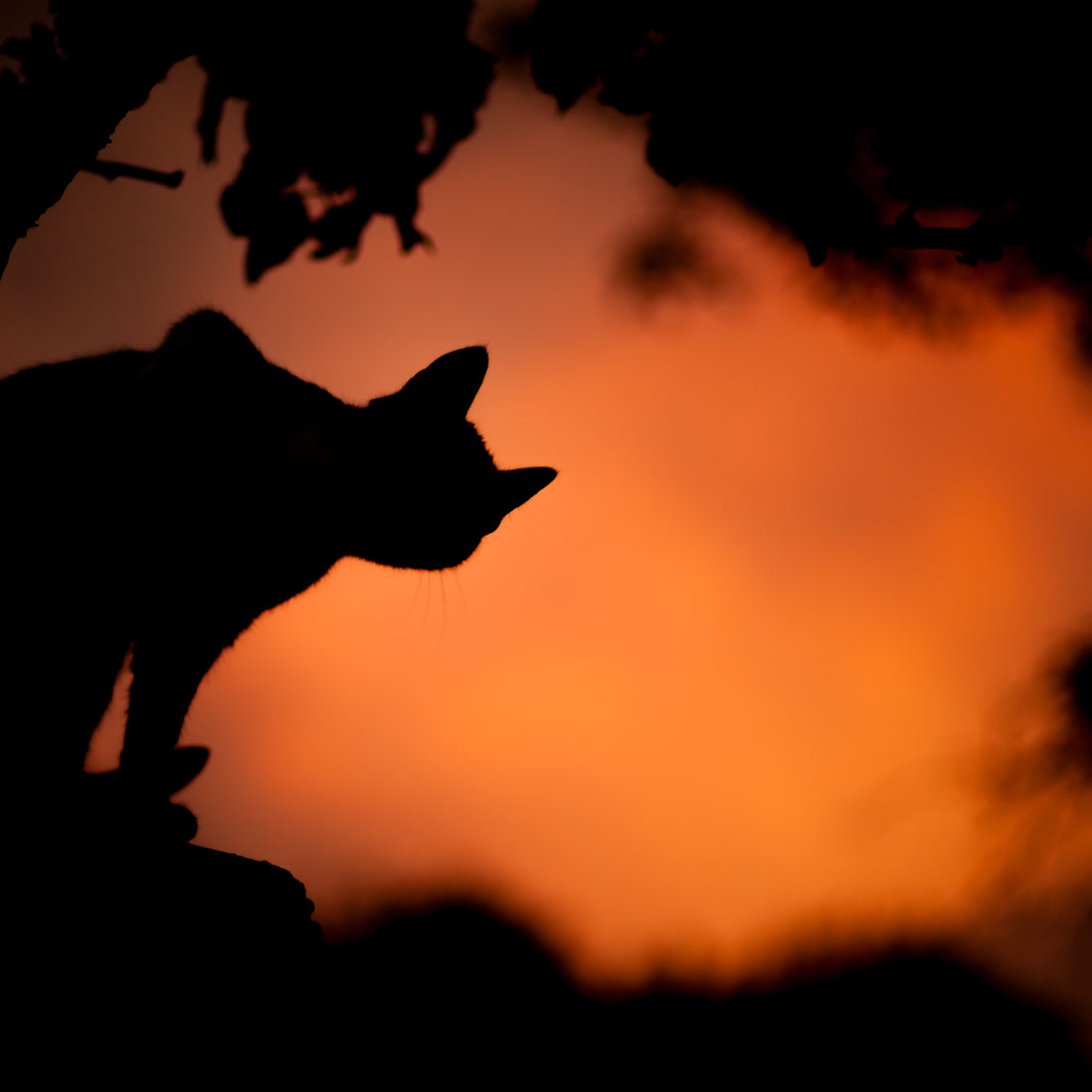When people think of Halloween, they often think of pumpkins, ghosts, and witches. And what goes better with witches than a black cat!
Black Cat Facts
According to Cat Fanciers’ Association, there are currently 22 breeds of cats that are recognized as “black cats”, but the only solid colored black cat is the Bombay cat.
The Bombay cat breed is a cross between a Sable Burmese and a Black American Shorthair, and was bred with the goal of creating a miniature black panther!
Research shows that black cats have a mutation that appears to make them less susceptible to diseases, such as Feline HIV.
Due to the amount of melanin black cats have, most have golden/yellow colored eyes, a trait that makes them even more striking!
Sadly, because of the potential for abuse, many shelters halt adoptions of black cats over Halloween. It is also very strongly suggested that if you have a black cat, you do not allow them to be outside during this time.

Black Cat Stigma Throughout History
We have all heard that a black cat crossing your path brings bad luck, but the negative superstition goes much deeper than that.
Black cats have been stigmatized throughout history in many cultures.
Going all the way back to Medieval times, superstitions and folklore promoted the unjustified and irrational belief that black cats were a bad omen, and associated with the devil.
Innocent people were not only accused of using black cats to carry out sorcery and witchcraft, and were wrongly persecuted. Historians estimate that between 40,000 - 50,000 people were executed for witchcraft throughout Europe during a 300-year period.
This misinformation about cats is what is believed to have led to the Bubonic Plague. The mass killing of cats, especially black cats, caused the mouse and rat populations to explode, allowing the plague to spread, ultimately causing the death of over 25 million people.
When the Pilgrims settled in America, they brought superstitions with them, including the belief that black cats were evil, and any female who had a black cat was thought to be a witch. This misguided superstition culminated in over 200 people being accused of witchcraft during the Salem Witch trials, and 20 executions.
The Origins of Black Cat Stigma
Before Christianity, the predominant belief system in Europe was Paganism, a mix of different Earth-centered “religions” that worshipped both male and female gods, as well animals and nature.
As Christianity spread, it brought with it the belief that Paganism was associated with the devil.
Then, in 1233, Pope Gregory declared black cats to be a symbol of Satan, a proclamation that led to terrible implications for all cats, as well as the folklore that still exists today.

Black Cat Love!
In ancient Egypt black cats were worshipped and considered sacred.
In Japan, black cats were thought to bring love and good fortune.
Some European countries viewed black cats to be a sign of prosperity.
Sailors and fishermen would bring black cats aboard their vessels, considering them to be symbols of good luck and good fortune.
Sailor’s wives believed having a black cat helped to keep their husbands safe at sea.
Although black cats were (and still are) considered good luck in certain cultures, in America, some of the underlying negative association still remains. This may be a reason why black cats in shelters are adopted less often than cats of other colors. Interestingly enough, statistics show that black dogs in shelters are also often overlooked, simply because of the color of their coat.
Orange Cats
Since they are orange, a Halloween color, we thought we would talk a little bit about the beauty and uniqueness of orange cats!
Orange cats are extremely common, but they are not a recognized breed, they are considered to be a type of Tabby cat.
Tabby cats are differentiated by their distinct striped coats that come in four different patterns.
Orange Tabby cats are often referred to as Ginger or Marmalade.
Because of their genetics, 80% of all orange cats are male, meaning only 1 in 5 are female.

Many people believe orange cats are more friendly, more docile, and more social than cats of other colors.
Their perceived friendliness may be due in part to the fact that they also seem be “chattier” than other cats, something that could perhaps lead to them forging a stronger bond with their owners.
But as all cat owners know, whether they are black, orange, or any other color, cats make wonderful pets and companions.
Remember to keep your cats safe over the holiday, and Happy Halloween to all of our Under the Weather friends!
Every Sale Supports a Shelter Pet. Learn More.
Made in Vermont. Learn More.




